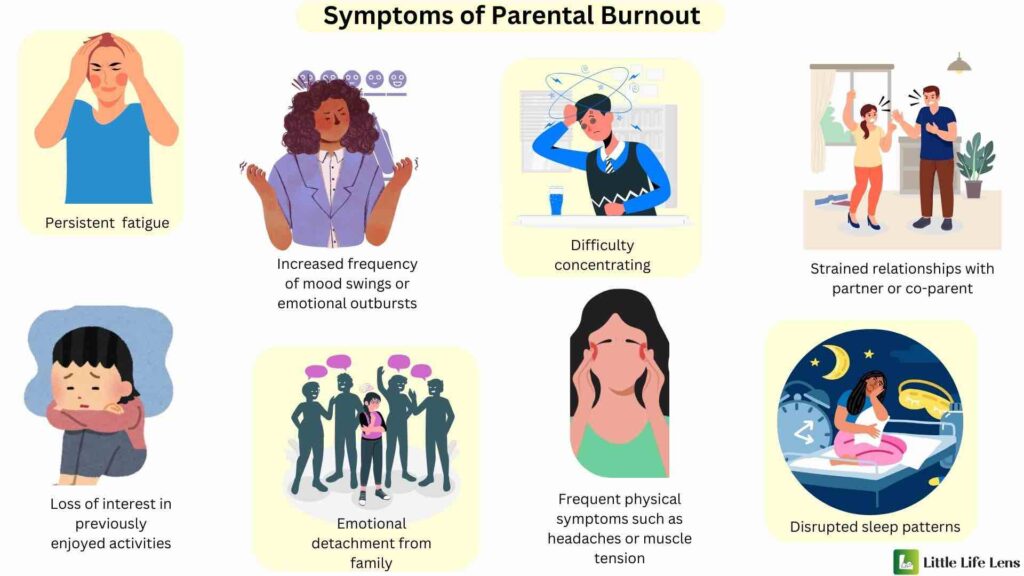Everywhere we turn, there’s news about the rising crisis in mental health among children. And it’s really making me think about something crucial – parental burnout. You know, that feeling when we’re so focused on our kids’ well-being that we forget about our own? It’s a big deal because it affects how we can be there for them.
And guess what? It doesn’t wait until they’re teenagers; it starts way earlier – like, from day one. So, if we want to give our kids the best, we’ve got to start by taking care of ourselves. And addressing parental burnout head-on is key.
Understanding Parental Burnout
Have you ever felt like being a parent is just… exhausting? Like, more than just the regular tiredness, but a deep-down, bone-weary kind of exhaustion? That’s what they call parental burnout.
Parental burnout is more than just feeling tired or stressed; it’s a state of chronic physical, emotional, and mental exhaustion resulting from the demands of parenting.
It includes:
- Feelings of overwhelm: Experiencing a sense of being unable to cope with the demands of parenting.
- Fatigue: Persistent feelings of physical and mental tiredness, often resulting from the stress of parenting responsibilities.
- A sense of being emotionally drained: Feeling depleted or exhausted emotionally due to the emotional demands of parenting.
Factors such as sleep deprivation, constant caregiving responsibilities, and lack of support, can contribute to parental burnout.
Unrealistic expectations also play a significant role in parental burnout. Society often glorifies the ‘perfect parent’ image where everything looks flawless all the time. That’s not realistic. But somehow, we still feel the pressure to live up to it, which just adds to the stress and strain.
Parental Burnout Impact on Babies and Toddlers
Parental burnout doesn’t just affect us; it can have a real impact on our little ones too. As you navigate the challenges of caregiving, exhaustion and stress can seep into the parent-child relationship, affecting your little one in myriad ways.
- Lack of emotional availability: When burnt out, you might struggle to be there emotionally for your baby. This means you may not always respond to your baby’s needs or cues as consistently as you should. This makes it harder for the baby to feel secure and develop strong emotional bonds.
- Stress transfer: Babies pick up on everything their parents do. So if you are resorting to unhealthy behaviours to cope with stress, it could impact how your baby learns to handle their own emotions later on.
- Impaired parent-child interaction: Burnout can make it tough for you to engage fully with your baby. You might not have the energy or patience for beautiful moments of connection, like playing together or sharing affection. This hinders the baby’s social and cognitive growth.
- Impact on physical health: Parental burnout doesn’t just affect emotions; it can also impact physical health. When you’re exhausted and drained, you might not have the motivation for activities that promote your baby’s physical development, like playing and exploring outdoors. This could potentially delay milestones and impact your baby’s overall health and well-being.
Parental Burnout Symptoms and Signs

Identifying parental burnout symptoms is crucial for recognizing when help is needed. Here are some common indicators to watch out for:
- Continual fatigue, even after adequate rest and sleep
- Feelings of irritability and impatience towards your baby
- Decreased engagement in previously enjoyable activities
- Difficulty concentrating or making decisions about even simple things
- Increased reliance on unhealthy coping mechanisms (e.g., excessive drinking, overeating)
- Feeling emotionally disconnected from your family
- Experiencing regular physical symptoms like headaches or muscle tension
- Difficulties in your relationship with your partner or co-parent
- Decreased productivity at work or in other areas of life
- Changes in appetite or weight
- More frequent mood swings or emotional outbursts
- Disrupted sleep patterns, such as difficulty falling asleep or staying asleep
Ways to Overcome Parental Burnout
It can be difficult to practice self-care, seek support, set boundaries, and practice mindfulness. But when you do, it has a positive impact on your mental health – and thus, helps you to prevent/overcome burnout.
Make self-care a priority
According to a recent study, 60% of parents neglect to prioritize relaxation and rejuvenation in their daily routines. This finding got me reflecting on how parents often miss out on self-care or feel guilty about taking time for themselves.
But it’s crucial to recognize that neglecting self-care can impact your ability to be the kind of parent you wish to be. Self-care doesn’t necessarily have to be about lavish spa days; it can be as simple as stealing small moments and spending time doing what you love.
So, the first thing you need to know is that self-care isn’t selfish—it’s essential for your well-being and your ability to care for others. It could be having a moment with your favourite book while your baby naps, going for a leisurely walk alone to clear your mind, or simply having coffee in peace before the day’s chaos begins.
If you can’t do it all alone, seek support from others
Be it about managing household chores or dealing with emotional struggles, ask for support whenever you need it. It’s natural that as a parent, you want to do everything possible for your baby, but trying to do it all alone may lead to exhaustion. So, don’t hesitate to deviate from the mindset that you have to handle everything solo.
By reaching out for support, whether it’s from your partner, family, friends, or support groups, you can lighten the load. This can provide you with more quality time to spend with your baby, nurture your well-being, and remain fresh and energized for the demands of parenthood.
Take time to understand yourself
Is there any change in the way you approach daily activities? Do you notice any shifts in your emotional state? Are you experiencing increased stress or irritability? Take time to pay attention to these subtle changes.
This will help you recognize the early signs of burnout. Don’t wait until it becomes overwhelming. We often ignore minor symptoms, thinking they’ll go away on their own, but addressing them early on can prevent them from escalating.
Regular self-reflection, journaling, and mindfulness practices like meditation or deep breathing exercises are a few ways you can cultivate self-awareness and prevent burnout.
Parental Burnout Can Be Managed
Parental burnout can be effectively overcome with awareness, self-care, and support. Recognizing the signs and symptoms of burnout is the first step toward addressing this issue. You can regain balance and resilience in your parenting journey by acknowledging your needs and taking proactive steps to prioritize your mental and emotional well-being. Remember, you are not alone in this struggle. Seeking support from healthcare professionals, family, friends, or support groups can provide valuable assistance and guidance. By nurturing yourself, you create a positive ripple effect, building a healthier environment for you and your child.




